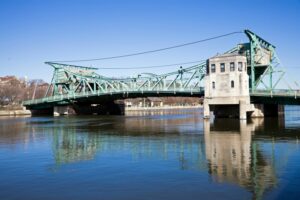It’s about to get chilly out there again, folks. How happy are you with your heating system? Did it do a fantastic job last winter? Is it still relatively new? Or do you have some concerns? If your heater is getting older, would need repair in order to get running again, or just isn’t performing efficiently, it’s time to consider what you might want to replace it with.
You’ve surely heard that heat pumps are incredibly efficient. But do they work in our climate in Illinois? Or would a furnace be better?
How Heat Pumps Operate So Efficiently
A heat pump works on the same principle as an air conditioner. It uses refrigerant, flowing through coils, to move heat from one place to another. Like an air conditioner, it can carry heat from indoors and release it outside.
But the flow of the refrigerant can also be reversed, which is how the heating mode works. The refrigerant absorbs heat from outdoors—even if it’s colder outside than in, it only has to be warmer than the super-cooled refrigerant—and releases it indoors. Generating heat uses a lot of energy. But moving heat from one place to another uses a very small amount of energy. This means that a heat pump is the most efficient way to heat.
When a Heat Pump’s Efficiency Drops
When the outdoor temperature is below 40 degrees Fahrenheit, a heat pump is unable to be quite as efficient. As the temperature drops further, it gets less efficient. During long stretches when the temperature never gets above freezing, the heat pump would have to use much more energy, and it might not do a fantastic job of keeping a house warm.
In a well-insulated house in a somewhat warmer climate, a heat pump would provide all the heat that was necessary, and do it without using much energy. But around here, it just might not be enough without a little extra help or investing in a cold-weather heat pump. These are heat pumps that are able to work efficiently even in single-digit temperatures.
Dual Fuel Systems
Another solution to this drop in efficiency and effectiveness is a dual fuel system. This pairs a gas furnace—more efficient and less expensive to operate than an electric furnace—with your heat pump. When the temperature gets too low and the heat pump begins to struggle, it automatically triggers the gas furnace to come on. When the temperature rises again, the heat pump takes over.
This way, you can get all the benefits of the heat pump while never worrying about whether you’ll be warm enough. Your furnace will only be used when it’s absolutely necessary, keeping your gas bills very low. And you won’t have to keep track of when to switch your heating system over. It will take care of that all by itself!
Now that you know just how much more efficiently you could be heating your home, we hope you’ll consider a heat pump with a dual fuel system for your home. Don’t hesitate to reach out if you have any questions or need heat pump service in Joliet, IL.
Call J&A today, Sleep-tight tonight!

